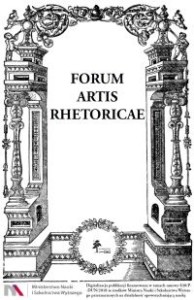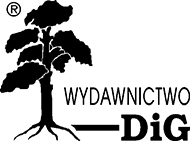Lector Benevole!
Numer obecny, który powstał w związku z IV Kongresem Dydaktyki Polonistycznej
(Poznań, 20–23 listopada 2019), przynosi artykuły, z których każdy ukazuje
jak zastosować retorykę w procesie dydaktycznym przede wszystkim w szkole
(acz zawarte tu uwagi można przenieść i do dydaktyki szkoły wyższej).
Dział Artykułów przynosi kilka ważnych prac. Pierwszą z nich jest studium
Krzysztofa Obremskiego Polskie tytuły Józefa Stalina lat 1944–1956 w kontekście europejskiej
tradycji pochwały władcy: powierzchniowo postępowe — głębinowo reakcyjne
(Polish titles of Joseph Stalin in 1944–1956 in the context of the European tradition
of praise of the ruler: surface progressive — deep-reactionary) to, jak pisze Autor:
pytanie związane z polskimi tytułami Józefa Stalina lat 1944–1956 brzmi: były one jeszcze
socjalistyczne czy już komunistyczne? Niepodobna zdecydowanie odpowiedzieć, gdyż
w ówczesnych wypowiedziach ideologów granica oddzielająca socjalizm od komunizmu
bywała zmienna, względna czy przynajmniej niedookreślona, a zarazem nie sposób abstrahować
od niekiedy jednak podstawowych różnic ustrojowych przeciwstawiających ZSRR
i PRL. W takim stanie rzeczy zamiast wikłać się w dwie wielorako poprzeplatane materie
(ideologiczną oraz ustrojowo-polityczną) należy splot nimi współtworzony niejako ominąć
i poprzestać (jak w tytule tej publikacji) na przymiotniku ‘postępowy’ — w swoich znaczeniach
zawierającym i socjalizm, i komunizm. Za takim wyjściem przemawia również
jeden z tytułów Stalina: Symbol wszystkiego, co przodujące, co postępowe.
Studium świetnie ukazuje problem metaforyki używanej w tekstach politycznych
i jest dobrym wprowadzeniem do samodzielnego analizowania tego typu
wypowiedzi.
Tekst Magdaleny Ostolskiej Kształcenie głosu jako metoda pracy nauczyciela
nad samorozwojem (Moulding vocal skills as a method of teachers work over self-
development), dotyczy — jak sądzę — nieco zaniedbanego elementu kształcenia
szkolnego. Tekst ten uzupełnia znakomicie studium trzech autorek: Ewy Lewandowskiej-Tarasiuk, Magdaleny Ostolskiej, Katarzyny Kasperkiewicz-Morlewskiej,
Metodyka polonistyczna wobec nowych wyzwań edukacyjnych. Część I —
Praktyka czytania — Wiedza — Interpretacja. Część II — Idee nowego wychowania
a współczesność. Część III — Kreatywność na lekcjach z poezją w obliczu wyzwań
trzeciego tysiąclecia (Methodology of Polish language teaching in the face of new educational
challenges. I. Reading practice — Knowledge- Interpretation. II. Ideas of New
Education and Modern Times. III. Creativity in poetry lessons in the face of the challenges
of the third millennium). Jak piszą autorki we wstępie:
nowoczesna metodyka polonistyczna na każdym etapie kształcenia powinna oferować
nowe, niestereotypowe rozwiązania dydaktyczno-metodyczne, nie wynikające jedynie
z fi lologicznej wiedzy, ale realizować ideę tytułu ostatniej książki edukacyjnego doradcy
prezydenta, Andrzeja Waśko, który tak oto ją sformułował: O edukacji literackiej (nie tylko
dla polonistów)
Z tekstem Krzysztofa Obremskiego dobrze koresponduje artykuł Jakuba
Z. Lichańskiego By uczyć się pisania od mistrzów pióra, czyli lektury szkolne jako
wzorce wypowiedzi argumentacyjnej. Jak budować wywód argumentacyjny: kilka
spostrzeżeń (How to learn writing from the masters of the pen, or school readings as
the patterns of argumentative expression. How to build argumentative essay: a some
comments), który poświęcony jest praktycznym wskazówkom jak wykorzystać
lektury szkolne do praktycznego nauczania przygotowywania esejów argumentacyjnych
i, szerzej, wypowiedzi o charakterze argumentacyjnym.
Dział Tłumaczeń przynosi obszerny komentarz do rozdziału VII Edukacja
i propaganda ze znanego dzieła Edwarda Bernaysa Propaganda (1928).
Dział Recenzji i Przeglądów prezentuje krótkie omówienie interesującej książki
Kamila Zeidlera, Barbary Tecław, Perelman, Wydawnictwo Arche, Sopot 2018
(Kamil Zeidler, Barbara Tecław, Perelman, Edition Arche, Sopot 2018).
Redaktorzy wyrażają nadzieję, iż pismo, tak jak dotąd kwartalnik, będzie służyć
integrowaniu środowiska miłośników retoryki oraz propagowaniu tej wspaniałej
nauki. Zawsze jednak w duchu Platońskiej idei kalokagathia.
Kind Reader
Th e present number, which was created in connection with the IV Congress
of Didactics of Polish Studies (Poznań, November 20–23, 2019), brings articles,
each of which shows how to apply rhetoric in the didactic process primarily
in school (although the remarks included here can be transferred and didactics
of the university).
Th e section DISSERTETIONS brings several important works. Th e fi rst
of these is the study by Krzysztof Obremski’s Polish titles of Joseph Stalin
EDITORIAL
Forum Artis Rhetoricae, ISSN 1733–1986, nr 3/2019, s. 3–6
5
in 1944–1956 in the context of the European tradition of praise of the ruler: surface
progressive — deep-reactionary (Polskie tytuły Józefa Stalina lat 1944–1956 w kontekście
europejskiej tradycji pochwały władcy: powierzchniowo postępowe —
głębinowo-reakcyjne) is, as the author writes:
[q]uestion related to the Polish titles of Joseph Stalin in 1944–1956 is: were they still socialist
or already communist? It is impossible to answer defi nitively, because in the statements
of ideologists at the time, the border separating socialism from communism was sometimes
variable, relative or at least indeterminate, and at the same time it was impossible to
abstract from the basic systemic diff erences opposing the USSR and the PRL. In such a state
of aff airs, instead of entangling in two intertwined matters (ideological and political-systemic),
we should intertwine them co-created, somehow, bypass and stop (as in the title
of this publication) on the adjective ‘progressive’ — in its meanings containing socialism
and communism. One of Stalin’s titles also speaks in favor of this: Th e symbol of everything
that is advanced and progressive.
Th e entries co-create the state of osmosis between historical matter and myth,
religion and utopia, which is symptomatic of Marxism — Leninism — Stalinism.
Th e study well illustrates the problem of metaphors used in political texts
and is a good introduction to the independent analysis of such statements.
Valuable is also text by Magdalena Ostolska Moulding vocal skills as a method
of teachers work over self-development (Kształcenie głosu jako metoda pracy
nauczyciela nad samorozwojem), which relates to — I think — somewhat neglected
element of school education. Th is text is perfectly complemented by a study
of three authors: Ewa Lewandowska-Tarasiuk, Magdalena Ostolska, Katarzyna
Kasperkiewicz- Morlewska, Methodology of Polish language teaching in the face
of new educational challenges. I. Reading practice — Knowledge — Interpretation.
II. Ideas of New Education and Modern Times. III. Creativity in poetry lessons
in the face of the challenges of the third millennium (Metodyka polonistyczna wobec
nowych wyzwań edukacyjnych. Część I — Praktyka czytania, Wiedza — Interpretacja.
Część II — Idee Nowego Wychowania a współczesność. Część III — Kreatywność
na lekcjach z poezją w obliczu wyzwań trzeciego tysiąclecia). As the authors
write in the introduction:
[Th e] modern Polish language teaching methodology at every stage of education should offer
new, non-stereotypical didactic and methodological solutions, not resulting only from
philological knowledge, but also bring forward the idea contained in the title of the last
book written by the president’s advisor for education, Andrzej Waśko: On literary education
(not only for Polish language students).
Th e article very well corresponds with Obremskis’ text is the study by Jakub
Z. Lichański How learn writing from the masters of the pen, or school readings
as the patterns of argumentative expression. How to build argumentative essay:
a some comments (By uczyć się pisania od mistrzów pióra, czyli lektury szkolne jako
wzorce wypowiedzi argumentacyjnej. Jak budować wywód argumentacyjny: kilka
spostrzeżeń), which is devoted to practical tips on how to use school reading to
practice teaching the preparation of argumentative essays and, more broadly, argumentative
statements.
Th e Section Translation brings an extensive commentary to Chapter VII Education
and propaganda from the famous work of Edward Bernays Propagand
(1928).
Th e section Reviews brings a short discussion of extremely interesting book
devoted to the Chaim Perelman, cf. Kamil Zeidler, Barbara Tecław, Perelman,
Wyd. Arche, Sopot 2018 / Kamil Zeidler, Barbara Tecław, Perelman, Edition
Arche, Sopot 2018.
Th e editors express the hope that the journal, as it has been so far, will serve to
integrate the rhetoric enthusiasts’ community and to propagate this great science.
Always, however, in the spirit of the Platonic idea of kalokagathia.
Jakub Z. Lichański
Editor-in-Chief
ORCID: 0000-0002-1943-5069



 57 (2019)
57 (2019)
